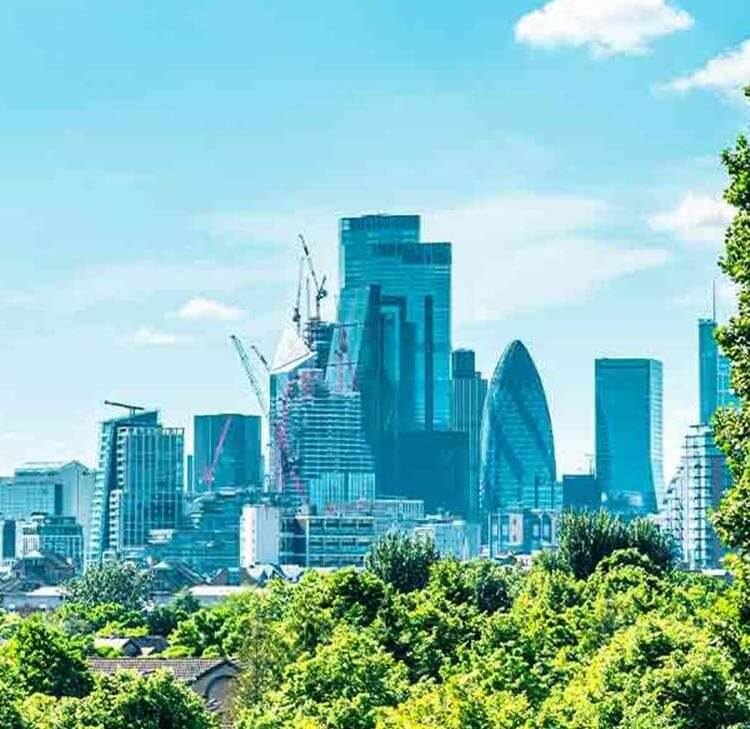Legally binding target for net-zero emissions by 2050
Last month the government’s advisory Committee on Climate Change published a report urging the government to commit to cutting greenhouse gases by 100% by 2050 when compared to 1990 emissions (known as net-zero).
This article is taken from June's public matters newsletter. Click here to view more articles from this issue.
Last month the government’s advisory Committee on Climate Change published a report urging the government to commit to cutting greenhouse gases by 100% by 2050 when compared to 1990 emissions (known as net-zero).
This commitment, also known as zero-carbon, includes not just carbon dioxide but also methane and nitrous oxide which are emitted from fossil fuels and during agricultural and industrial activities. This would allow the UK to meet its commitments to the “highest possible ambition” in respect of “a balance between anthropogenic emissions by sources and removals by sinks” under Article 4 of the international Paris Agreement. The Committee on Climate Change suggested this commitment will allow for opportunities for the UK to lead by example on climate change and greater international collaboration. The report also recommended a 95% reduction in greenhouse gases by 2050 for Wales. Scotland was assessed to have a greater capacity to remove emissions than the UK as a whole and was therefore set a net-zero commitment by 2050 (relative to 1990). This Committee on Climate Change’s call comes in the aftermath of an unprecedented move by the government on 1 May 2019 to declare a climate change emergency.
Whilst Whitehall paused to think about this recommendation, Scotland announced that it had committed to amending its Climate Change Bill to reflect the Committee on Climate Change’s advice. The Welsh Government committed to their reduction target and aim to exceed this with a goal of net-zero by 2050. On 12 June Theresa May committed the UK to net-zero carbon emissions by 2015. This legally binding commitment will be introduced by amending section 1 of the Climate Act 2008, so that it subsection 1, 80% is substituted for 100%. The amending SI is intended to be the ‘The Climate Change Act 2008 (2050 Target Amendment) Order 2019’. Whilst this statement is a simple one, in practice significant change to policies and budgets will be needed in order to meet this requirement.
The Committee on Climate Change report
In the Committee on Climate Change’s report, ‘Net Zero, The UK’s contribution to stopping global warming’ dated May 2019; the Committee on Climate Change highlighted the key features of this commitment:
- Feasibility - this target is feasible as a result of increasing technologies and a better understanding of the approaches needed to deliver net-zero.
- Cost effectiveness - this target is also cost effective because of the decreasing cost of key technologies permitting a more ambitious target when compared to the government’s existing financial commitment to tackling climate change.
- International collaboration - whilst encouragement for international collaboration is there, the Committee on Climate Change requires the UK to meet the target without the use of international carbon credits. These can only be used as a last resort.
- A ‘ramp up’ in policy efforts - the foundations are in place for policy development but there will need to be a ‘ramp up’ in policy effort to meet this target, the Committee on Climate Change says. Broadly, this should cover all sectors of the economy, including aviation and shipping. This development will infiltrate sector-based legislation and manifest itself in the form of policies on low carbon heating, electricity, efficient buildings, electric vehicles, banning biodegradable waste, land use, phasing out fluorinated gases, carbon capture and storage, agriculture and land use. Delivery must be brought forward for the ban on new petrol and diesel car sales to 2035, decarbonising heating systems, the deployment of carbon capture and storage at scale and the rewilding of 20,000 hectares of land annually.
- Societal shifts are required including:
- a shift towards diets which reduce the consumption of beef, lamb and dairy products;
- full utilisation of public transport systems and car clubs, where a car is required;
- the minimisation of long haul flights where possible;
- an end to traditional gas boilers;
- a switch from petrol to electric vehicles;
- green electricity improvements in the home;
- elimination of food waste and mandatory separation of waste at home; and
- an increased uptake of walking and cycling activities as the primary means of transport.
- Clear leadership from government and delivery strategies in partnership with businesses and communities.
- A Treasury funding review – the Committee on Climate Change draws attention to the fact that any policies will need to be adequately funded and the Treasury will need to analyse “how the transition net-zero will be funded and where the costs will fall” and “develop a strategy to ensure its fair” with the protection of “vulnerable workers and consumers” in mind.
- Consistency - it requires consistent implementation across sectors of the economy to stimulate the necessary innovation, market development and consumer uptake of low-carbon technologies and fuel social change.
- Carbon capture - carbon capture will be ‘crucial’ to the delivery of the target. The Committee on Climate Change has previously recommended that the UK’s first CCS cluster be operational by 2026, with two clusters, capturing at least 10MtCO2, operating by 2030. The Committee on Climate Change highlights the need for government to take the “lead on infrastructure development, with long-term contracts to reward carbon capture plants and encourage investment”.
- Electric or hydrogen vehicles by 2035 (if not earlier) – importantly, the Committee on Climate Change suggests that this could help position the UK to take advantage of shifts in global markets. Charging infrastructure will need to be strengthened by the government, including for drivers without access to off-street parking. Heavy goods vehicles should have the necessary infrastructure by late 2020s and throughout the 2030s, it says.
- Biodegradable waste streams should not be sent to landfill by 2025 – stronger regulation in this respect including mandatory separation of waste.
- Rapid expansion of low-carbon power – a continued expansion of low-carbon power is recommended, with an aim to increase from 2030. Government intervention may be needed to “backing long-term contracts aligned to expected wholesale prices”. Policy and regulatory frameworks are recommended to “encourage flexibility (e.g. demand response, storage and interconnection).”
- “An overhaul of low-carbon heating and energy efficiency” – the government’s planned 2020 Heat Roadmap must be ‘fully funded’ and will need to lead to full decarbonisation of buildings by 2050.
- Funding to incentivise industries to reduce their emissions – this will need to fund energy and resource efficiency, electrification, hydrogen without having an impact on their ability to compete. It is hoped that international sector agreements and procurement will drive consumer change and border tariffs could have a role to play for imports.
- Aviation and shipping targets to tackle emissions – the Committee on Climate Change will revise targets set by the International Civil Aviation Organisation and the International Maritime Organisation and set out its advice later his year.
- Support for research for greenhouse gas removal options – it should “signal the longer-term market, which is clearly needed to meet a net-zero target, by developing the governance rules and market mechanisms to pay for emissions removals”.
- Policies for healthier diets to drive land use – consumer policies to drive diet change with lower beef, lamb and dairy consumption with overall aim to increase in forest cover from 13% to 17%.
- Agricultural policies to change farming practices and reduce emission - financial payments in the UK Agriculture Bill are to be linked to actions to reduce and sequester emissions, taking effect from 2022. A fifth of agricultural land should be used to support emissions reduction such as tree planting, biomass production and peatland restoration.
The Committee on Climate Change has been tasked with providing more detailed advice to the government on how this target can be achieved. Statutory advice on the proposed UK carbon budgets to 2037 is also due next year.
Chair of the Committee on Climate Change, said he looked “forward to the same cross-party consensus that we saw in 2008, when the Climate Change Act became law” and signalled that law is “the first step” and “must now be reinforced by credible UK policies, across government, inspiring a strong response from business, industry and society as a whole”.
The impact for public bodies
It is clear from the Committee on Climate Change’s report that significant change is going to be required to meet the net zero carbon emissions target by 2050. Public bodies are likely to have a key role to play in this. Whilst private individuals and businesses can help drive change, public bodies will be required to incentivise and provide the infrastructure to allow this to happen. For example planning authorities have a key role in approving charging points for electric cars and ensuring that new buildings are ‘de-carbonised’.
There is however likely to be conflict with existing policy objectives. For example the government’s current drive for housing may come into conflict with the requirement to make those new homes greener. There will need to be a balance between the number of homes being built and the green credentials of those homes.
Despite the obvious role that public bodies will need to play in meeting the target of net-zero carbon emissions by 2050, significant budgetary cuts over the last decade have left many in financial difficulties which may make new green policies more difficult to implement. To meet the target it is likely that significant resources will need to be provided to the public sector. The Chancellor suggested that the target will require further spending cuts to public services, however no spending plan has yet been announced.
Accordingly, now maybe a sensible time for public bodies to consider how they can assist the government in reaching this target, and the funding required to do so, so that they can input in any future spending review. Greater Manchester combined authority has placed an ambition to become carbon neutral by 2038 at the heart of its industrial strategy which was launched earlier this month. It is likely that public bodies will require similar ambitions in their strategic planning documents, to pave the way for polices to reach the national target.
The current political situation has created uncertainty for the public sector. The pledge to have net-zero carbon emissions by 2050 is certainly a headline grabber but is currently short on detail as to how this will be met. What can be certain is that this is going to create new challenges for public bodies and is something that public bodies should follow closely. Public bodies should take steps (such as responding to consultations) to ensure that the government is aware of the effect of the new policy and the resources required to implement the policy.
Prime Minister Theresa May commented, “we must lead the world to a cleaner, greener form of growth. Standing by is not an option. Reaching net zero by 2050 is an ambitious target, but it is crucial that we achieve it to ensure we protect our planet for future generations.” What remains to be seen is how the next leader legislates for and funds this change.









































